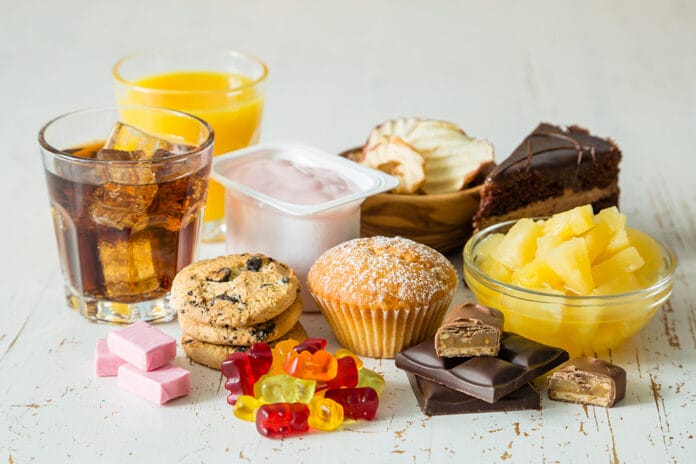During a recent conversation, a dental patient’s lack of understanding about sugar left my head spinning. The patient had rampant dental decay and was concerned about the amount of money it was going to cost for treatment. I asked him if he knew what caused the problem? After a short pause, he came up with this: Years since his last visit and coffee. Hmmm…
I probed: Why do you think coffee is causing your problem? He explained that all he put in his coffee was “a little” sugar, but that was the only thing he could think of that had sugar in it. I asked how much was “a little.” “Only a packet and a half in a medium-sized cup,” he explained.
He followed up with the fact he only had about two of those a day. Interesting, I thought. Wow! How can so much decay be present with only “a little” sugar? There had to be more to this story. So, I waited and began to scale his teeth.
A bit later, as the wheels were turning, he interrupted treatment to tell me his girlfriend had started drinking green tea, and he had been doing the same. Apparently, it helps him replace the Coke he usually drinks while at work. What! Oh, you drink Coke? “Oh, yes. It’s my go-to drink.”
OK, clearly, there is a big miss of information here. I asked him if he knew how much sugar was in those Cokes? He had no idea. Then he followed up with the question, “Do Gatorade and Powerade have sugar? I drink those too.”
Insert Emoji eye roll and slap on the forehead!
Continuing the Conversation
With the ability to just stop talking and listen, there is so much to learn from conversations. Creating an environment for behavioral change is essential for any real advancement in oral health. Over the course of this conversation, this dental patient was able to understand the cause of his problem better. I simply asked questions, paused, and inquired a bit more.
Too often, we think of added sugars as something we have spooned in, not what food manufacturers have already put into their products. The accumulation of sugar in our system causes disease due to our body’s inflammatory response to those toxins.
Research after research has confirmed this to be the case. One study, in particular, demonstrates the role of sugar on the oral cavity even in the absence of daily oral hygiene.1 This study showed that what we eat directly affects our dental health, and we know our mouth is not a separate entity from our body.
The researchers were curious to see what effect the caveman diet would have on oral health. An assessment was completed prior to the study, including bleeding on probing, gingival and plaque indices, and probing depths. For four weeks, the participants consumed a caveman-type diet (void of refined sugar) and were instructed not to use any oral hygiene aids.
At the end of the study, an oral assessment was completed on the participants. Results revealed that the subjects had an overall improved oral health outcome even in the absence of cleaning their teeth. Of course, there was more plaque, but the plaque had changed from gram-negative to gram-positive bacteria.
Reading this study gave me an even better understanding of how the role of sugar plays in our overall health. By changing our foods, our body will adapt to either health or disease. We get to choose.
If we were given a jar of the amount of sugar we consume on a given day, we would look at it and say, “There is no way I eat that much sugar.” But when it’s added to other ingredients, it’s easy to lose track.
Sugar is an addictive substance that is found in most packaged products. Even though there is widespread knowledge that sugar plays a key role in tooth decay, the U.S. sugar industry leaders advocate for policies that do not urge people to eat less sugar. Rather, they recommend ways to break up dental plaque.2 I have personally witnessed patients who presented with little to no plaque or calculus yet had severe gingivitis. These patients were doing their due diligence in homecare yet presented with disease. There is more than meets the eye.
Most people can identify diabetes as a disease affected by sugar consumption, but so is cancer, autoimmune disorders, irritable bowel syndrome, eczema, heart disease, Alzheimer’s disease, and the list goes on. While it’s true that people are living longer due to prescription medications, that quality of life is questionable.
As a dental hygienist, my goal is to not only help my patients understand the damaging effects of sugar but how to make small changes that lead to big results. Creating a space for behavioral change is the key. Motivational interviewing is one modality, but there are many more ways to be successful and coach the patient.
I was feeling a bit burned out in my career and looking for new inspiration and decided to complete my bachelor’s degree in oral health promotion. During this course, I learned a new and better approach to communicating with my patients that has led to successful behavior changes and outcomes. Rather than the “teach and preach” method I was using in my practice, I learned to listen to my patients and meet them where they are. I give them choices and help them discover what works for them in meeting their goals, not mine.
I’m happier and more confident in my operatory and look forward to working. I’ve been able to coach my patients rather than lecture them.
Not Only Lip Service
For nearly a decade, I’ve been reading about health and wellness with a particular interest in sugar and its role in our body and cravings. The tongue and brain can weigh heavily on food choices, especially when it comes to sweets. One thing I realized for myself was sugar’s effect on my body ‒ not only in physiology (weight gain) but psychologically (brain fog, failure to recall words) as well.
Inflammation can single-handedly destroy the body’s system cell by cell, organ by organ. Sugar affects the way the white blood cells attack bacteria. Sugar triggers a low-grade inflammatory response in the body, and it grows from there.3 For a body that is already compromised, consuming sugar is like adding a piece of wood to the fire. It just keeps burning hotter and hotter. How many of our patients are already compromised with a health diagnosis?
There is also evidence demonstrating that consuming 75 to 100 grams of sugar is enough to hinder the body’s immune function.4 That may sound like a lot (and it is), but it’s essentially two cans of soda. Even consuming a grande chai latte from your favorite coffee shop will get you halfway there.
When sugar is consumed, it temporarily tamps downs the immune system’s ability to respond to challenges. This impairment can last several hours. If sweets are consumed throughout the day, then the immune system is at a disadvantage for most of, if not, all day. How can the body fight off bacteria, viruses, or other assaults when there are no soldiers ready for battle?
Make the Change
For decades, I got two colds a year. It was usually during the spring and fall when the weather changed. However, it’s been years since I’ve had a cold or the flu. Mainly I contribute that to eating well, but I take seriously the amounts of sugar I consume. I’m not as strict as I used to be. I do indulge from time to time for a special occasion. Ironically, my body tells me pretty quickly it doesn’t like it. So, that keeps me in check. That foggy-headed feeling returns along with the crash when the sugar runs out.
The other thing I notice is my propensity to want more sugar. The cravings start again, and I’m reminded of the toxic relationship we once shared. I’ve worked hard to get into shape both physically and mentally, and I’m not willing to sacrifice the hard work by eating high-calorie, nutrition-less sweets.
Breaking up with sugar is not easy. It may seem like a best friend, but I can assure you it’s not. Today, why not challenge yourself to avoid eating sugar? I suggest first documenting the amount of sugar consumed in a week. Document what is happening during that moment when that craving hits. What emotion or feeling is there?
Try to avoid added sugars altogether for the following week. It will be necessary to prepare the kitchen with fresh vegetables, proteins, and healthy fats to help with the cravings. It takes a mindset to do something so profound; however, I promise it will be worth it. As a warning, though, there will be withdrawal effects. But life gets so much better by the fifth day as you experience a clear mind, restful nights, and increased energy.
A dental hygienist would never ask the patient to do something we wouldn’t do ourselves. This exercise will be an experience that can be shared with patients and help coach them to better oral and systemic health outcomes. Are you up for the challenge?
Now Check Out the Peer-Reviewed, Self-Study CE Courses from Today’s RDH!
Listen to the Today’s RDH Dental Hygiene Podcast Below:
References
- Baumgartner, S., Imfeld, T., Schicht, O., Rath, C. The Impact of the Stone Age Diet on Gingival Conditions in the Absence of Oral Hygiene. Journal of Periodontology. 2009; 80(5): 759-68. DOI:10.1902/jop.2009.080376.
- Ferdman, R., The Untold Story of How the Sugar Industry Shaped Key Government Research About Your Teeth. The Washington Post. March 11, 2015. https://www.washingtonpost.com/news/wonk/wp/2015/03/11/the-sneaky-way-the-sugar-industry-shaped-government-funded-dental-research/
- Chen, L, Deng, H., et al. Inflammatory Responses and Inflammation—Associated Diseases in Organs. Oncotarget. Jan. 2018; 9(6) 7204-7218. DOI: 10.18632/oncotarget.23208.
- Sanchez, A., Reeser, J.L., Lau, H.S., et al. Role of Sugars in Human Neutrophilic Phagocytosis. The American Journal of Clinical Nutrition. 1973; 26(11): 1180-1184. https://academic.oup.com/ajcn/article-abstract/26/11/1180/4732762











